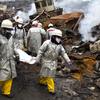Kateri A. Jochum appears in the following:
Supreme Court Gets Contentious on Campaign Finance
Wednesday, April 06, 2011
"We've been regulating campaign contributions since 1907," The New Yorker's Jeffrey Toobin reminds us at a time when it seems like many of the regulations may be overturned. The Supreme Court has had some flare ups recently over the string of cases brought in front of the court. With Justice Elena Kagan, the Court not only has the largest number of female Justices on board, but also a four to five weighting of Democrat versus Republican appointments. Although the court looks different, says Toobin, the rule of five still applies.
In Crisis, Federal Reserve Bailed Out Failing Banks
Tuesday, April 05, 2011
During the financial crisis, the Federal Reserve got a lot of flack for handing out big bailouts to major banks like Citibank and JP Morgan Chase, which were deemed "too big to fail." But it turns out that many more banks received funds through the Federal Reserve Bank's so-called “discount window” policy, including investment banks and foreign banks. The names of those banks were released last week, after the Supreme Court ruled in February that under the Freedom of Information Act, the Fed had to make the names and amounts known.
'Sweet Micky' Martelly Set to Become Haitian President
Tuesday, April 05, 2011
Results in Haiti show that musician Michel "Sweet Micky" Martelly has won the runoff for the presidential election. Martelly defeated former first lady Mirlande Manigat. Running on a campaign of change, the outsider garnered 67 percent of the vote, according to the Provisional Electoral Council, while Manigat only managed just over 30 percent. However, observers say turnout was low and Martelly has a slew of challenges facing him once he is in office.
Libya's Rebels Under Fire
Friday, April 01, 2011
Speaking to Congress on Thursday, Defense Secretary Robert Gates said that he opposes arming the Libyan rebels. Gate's position is in line with the NATO forces, who have taken over command of Operation Protectorate, as the air attack on Libya is now being called. NATO commanders say they will enforce the arms embargo, no-fly zone and focus on protecting civilians – but not necessarily the rebels.
Boys Make Up the Bulk of India's Population Surge
Friday, April 01, 2011
India’s population has tripled in size in the last 50 years, hitting a record 1.2 billion in 2010. India is set to outpace China by 2030, even though the population growth is slowing. But the data has a disturbing side, the ratio of boys to girls has dropped again. For every 1,000 boys only 914 girls are born. The gender imbalance is a result of sex selection, and may have far-reaching adverse effects for the country.
Nicholas Kristof on Post-Revolutionary Egypt
Wednesday, March 30, 2011
The Egyptian military high council has announced that parliamentary elections are being put off until September. Opposition leaders are asking for more time to organize themselves into political parties. Presidential elections, originally scheduled for August, will also be held then. While younger Egyptians are hopeful about elections, they have grown wary of the military high council, which has ceased to be the force for change that they had hoped for.
In Commodity Market, Cotton Really is King
Tuesday, March 29, 2011
Commodity prices are higher than they have been since before the financial crisis in 2008. But one commodity is doing better than all of the others: cotton. A pound of cotton currently costs more than $2 — that’s up from about 85 cents just a year ago, and higher than it has ever been in history. In fact, it is the second time since the Civil War that cotton has gone over $1. We talk with Gary Feist, a cotton farmer in Wakita, Oklahoma, who's been in the business for the past 15 years. Feist is also the manager of the Southern Kansas Cotton Growers Cooperative.
Gender and the Supreme Court's Wal-Mart Case
Tuesday, March 29, 2011
The arguments being heard by the Supreme Court today in Dukes vs. Wal-Mart are about whether there is enough of a connection between 1.5 million workers to validate their discrimination as a class-action suit. But this is not just the largest class-action suit ever, it is also the largest gender discrimination case in history. The plaintiffs are arguing that the world’s largest corporation maintained paid women less money, denied them promotions, and perpetuated a culture rife with gender stereotyping. And it will be heard by a Supreme Court with three female Justices — the most ever in history. Will their decision come down to gender vs. business?
Alan Cheuse on 'Song of Slaves in the Desert'
Monday, March 28, 2011
The history of slavery is interwoven with the history of America, but what most of us learn about in school is the history of white settlers. And even in that white history, there are particular characters — mostly Dutch and Anglo-Saxon Protestants. Not Catholics, and certainly not Jews. But that may be about to change. A new novel called “Song of Slaves in the Desert” centers on a slave family and its owners, who are Jewish. It’s written by Alan Cheuse, the novelist and George Mason University professor who you might know as the books reviewer for NPR’s All Things Considered.
GE's Tax Return: $3.2 Billion
Friday, March 25, 2011
Companies are using every loophole they can find to get a tax benefit — and it turns out they are doing it well. According to The New York Times, General Electric made $14.2 billion in profit last year, $5.1 billion of which came from its operations in the United States. But it turns out that not only did G.E. not pay any money in taxes, instead raking in another $3.2 billion in tax benefits.
What Kind of Aid Does Japan Really Need?
Thursday, March 24, 2011
More than 600 nonprofits have offered relief goods and materials to the people of Japan since the earthquake and tsunami. But with the exception of twelve countries with specialized search and rescue teams and a handful of international aid organizations, the Japanese government is politely turning them down. The Japanese Red Cross Society has yet to appeal for funds. Still, just like after every major natural disaster, dozens if not hundreds of new nonprofits have been registered. In the case of a major world economy like Japan, where and how does it make sense to give?
What if Gadhafi Wins? What if the Rebels Win?
Thursday, March 24, 2011
On day six of the United Nations-backed, U.S.-led Operation Odyssey Dawn operation in Libya, the outcome of the crisis is still unclear. But the future of the country doesn't just depend on which side comes out on top of the military conflict. It may come down to whether a leader is able to keep the petroleum and gas export-fueled economy going long enough to make real reforms, and keep the country fed in the process. However, at this point there are still a lot of unknowns regarding the situation.
Japan, Middle East Crises Push Up Oil, Gas Prices
Tuesday, March 22, 2011
Oil prices are solidly back over the $100 dollar per barrel. Political unrest in the Middle East has kept oil rising for the past months followed by concerns that Japan, the world's third largest economy and a nation that imports 60 percent of its fuel, would be reducing its oil usage, knocked oil futures back down briefly last week. But Monday, oil futures for April rose by more than $1 hitting $102.96 a barrel in trading on Wall Street.
Japan Rescue Efforts Turn to Relief
Tuesday, March 22, 2011
So far more than 8,000 people have been confirmed dead in Japan, but some 13,000 or more are still missing. In addition, nearly 500,000 Japanese have been displaced by the earthquake, tsunami and the nuclear crisis. Now, 11 days after that initial impact from the tsunami and quake, aid workers are shifting from rescue to relief missions, helping those who have been left behind.
How Risky Are Live Organ Donations?
Friday, March 18, 2011
The New York state health department released a report this week saying that an organ transplant recipient contracted HIV from a kidney donation at a New York hospital. It’s the nation’s first documented case of HIV transmission via a living donor transplant since the 1980s. How did this happen? And what are the repercussions?
Answering Your Questions on Nuclear Crisis
Friday, March 18, 2011
Yesterday we asked listeners: What do you want to know about the ongoing crisis in Japan? You gave us plenty to work with, and now we're going to have some of your best questions answered by our expert guest, David Biello, associate editor of environment and energy for Scientific American.
Fukushima and the Fallout
Thursday, March 17, 2011
The situation at the Fukushima Power Plant in Japan continues to worsen. U.S. Media is reporting that water levels are dropping in more than one of the six reactors at the plant, leaving nuclear fuel rods exposed. The United States Nuclear Regulatory Commission has warned that Japanese regulators may be downplaying the risk of radiation levels at the plant; and the commission has advised that Americans evacuate the area within 30 miles of Fukushima.
Journalists Missing in Libya
Thursday, March 17, 2011
Four journalists covering clashes between opposition fighters and the government forces in eastern Libya for The New York Times were reported missing, Wednesday. According to the paper, the journalists — photographers Tyler Hicks and Lynsey Addario, videographer Stephen Farrell and Pulitzer Prize-winning Beirut bureau chief Anthony Shadid — were last in contact with their editors on the morning of March 15, as rebels fled from the town of Ajdabiya, where they were stationed.
US Business Reacts to Japan
Wednesday, March 16, 2011
The crisis in Japan has finally hit home for stock markets around the world. Investors are concerned that electronics manufacturers, who import chips from Japan could be affected by lapses in the supply chain. Two of Japan's top companies, Honda and Toyota have halted production at their Japanese plants and Detroit is highly dependent on parts from Japan. At the same time, the disaster in Japan has raised questions about the energy industry here in the United States.
Questions About Japan's Energy Policy in Tsunami's Wake
Monday, March 14, 2011
The Japanese government has called a nuclear power emergency and evacuated nearly 200,000 people from the area surrounding two nuclear reactors as excessive radiation levels have been reported in the wake of a breakdown following Friday's earthquake. Japan has 55 reactors, which provide about one third of its total electricity, making it the world's third largest atomic energy user. This is the third time an earthquake has led to an accident at one of the country's nuclear plants in the past five years.


















